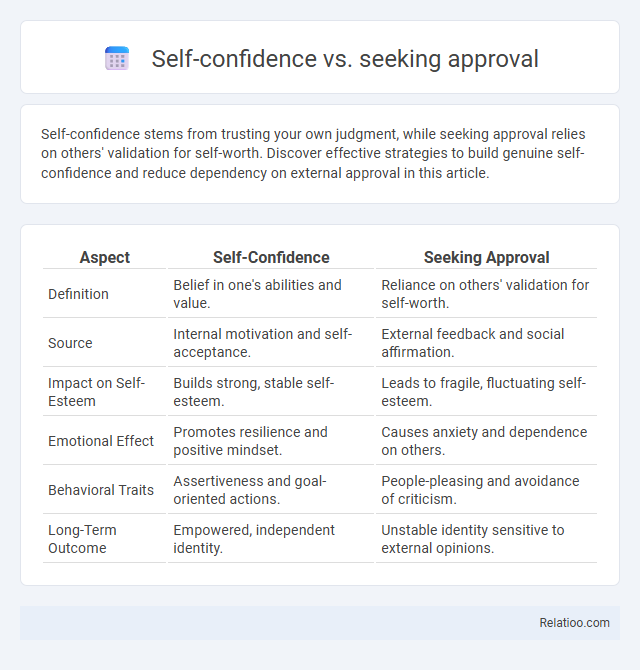Self-confidence stems from trusting your own judgment, while seeking approval relies on others' validation for self-worth. Discover effective strategies to build genuine self-confidence and reduce dependency on external approval in this article.
Table of Comparison
| Aspect | Self-Confidence | Seeking Approval |
|---|---|---|
| Definition | Belief in one's abilities and value. | Reliance on others' validation for self-worth. |
| Source | Internal motivation and self-acceptance. | External feedback and social affirmation. |
| Impact on Self-Esteem | Builds strong, stable self-esteem. | Leads to fragile, fluctuating self-esteem. |
| Emotional Effect | Promotes resilience and positive mindset. | Causes anxiety and dependence on others. |
| Behavioral Traits | Assertiveness and goal-oriented actions. | People-pleasing and avoidance of criticism. |
| Long-Term Outcome | Empowered, independent identity. | Unstable identity sensitive to external opinions. |
Understanding Self-Confidence
Understanding self-confidence involves recognizing an internal sense of worth and trust in one's abilities, independent of external validation. Unlike seeking approval, which relies on others' opinions to affirm self-value, true self-confidence is grounded in self-awareness and personal achievements. Developing self-confidence fosters resilience, empowering individuals to make decisions and take risks without constantly needing external approval.
What Drives the Need for Approval?
The need for approval is often driven by underlying insecurities and a desire for social acceptance, where individuals seek validation to reinforce their self-worth. Self-confidence arises from internal belief systems and intrinsic motivation, reducing dependency on external validation. In contrast, seeking approval stems from a fear of rejection or judgment, which can undermine authentic self-expression and personal growth.
Key Differences: Self-Confidence vs Seeking Approval
Self-confidence stems from an internal belief in your abilities and worth, whereas seeking approval relies on external validation from others to feel valued. Self-confident individuals make decisions based on personal judgment, while those seeking approval often adjust their actions to gain acceptance. Understanding this difference empowers you to build genuine self-esteem instead of depending on others' opinions.
Signs You Rely on External Validation
Relying on external validation is evident when your self-worth fluctuates based on others' opinions, causing you to seek constant approval in social or professional settings. Signs include needing reassurance before making decisions, feeling anxious about criticism, and prioritizing others' expectations over your own values. Cultivating self-confidence reduces this dependence, empowering you to trust your instincts and maintain emotional stability regardless of external feedback.
The Psychology Behind Self-Belief
Self-confidence stems from an internal sense of worth and competence, enabling you to trust your abilities without constantly relying on external validation. Seeking approval often reflects a dependence on others' opinions, which can undermine self-belief and lead to anxiety or indecision. Understanding the psychology behind self-belief reveals that genuine confidence grows from intrinsic motivation, self-awareness, and resilience rather than external approval or validation.
How Seeking Approval Limits Personal Growth
Seeking approval from others often hinders personal growth by creating dependency on external validation rather than fostering intrinsic motivation and self-confidence. Individuals who rely heavily on approval may avoid taking risks or expressing authentic opinions, limiting their ability to develop resilience and self-awareness. Building genuine self-confidence requires overcoming the need for constant affirmation and cultivating trust in one's own judgment and values.
Benefits of Cultivating Self-Confidence
Cultivating self-confidence fosters resilience, enhances decision-making, and promotes authentic self-expression, leading to improved mental well-being and stronger interpersonal relationships. Unlike seeking approval, which depends on external validation and can cause stress and insecurity, self-confidence builds a stable foundation of inner assurance and autonomy. By prioritizing self-confidence, individuals gain empowerment to pursue goals without fear of judgment, resulting in greater personal and professional success.
Practical Steps to Build Inner Confidence
Building inner confidence requires focusing on your values and achievements rather than seeking external approval from others. Practice positive self-talk, set realistic goals, and celebrate small victories to reinforce your self-worth. Embrace challenges as opportunities for growth, which strengthens your belief in your abilities without relying on outside validation.
Overcoming the Habit of Seeking Validation
Self-confidence stems from an internal belief in one's abilities and worth, which contrasts sharply with seeking approval that depends on external validation from others. Overcoming the habit of seeking validation requires cultivating self-awareness, setting personal boundaries, and affirming one's own values independent of outside opinions. This shift empowers individuals to make decisions rooted in self-trust, fostering resilience and authentic self-esteem.
Embracing Authenticity for Lasting Confidence
Self-confidence stems from embracing authenticity, allowing individuals to trust their true selves without relying on external validation or seeking approval from others. Seeking approval often undermines inner strength by fostering dependency on others' judgments, which can lead to fluctuating self-esteem and insecurity. Prioritizing self-acceptance and genuine expression builds lasting confidence rooted in personal values rather than the transient approval of others.

Infographic: Self-confidence vs Seeking approval
 relatioo.com
relatioo.com